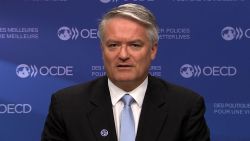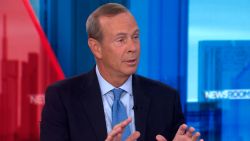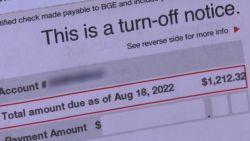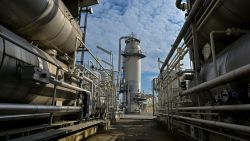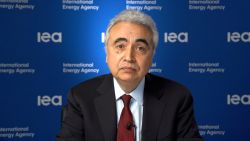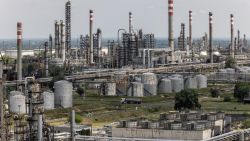A version of this story first appeared in CNN Business’ Before the Bell newsletter. Not a subscriber? You can sign up right here. You can listen to an audio version of the newsletter by clicking the same link.
For years, ExxonMobil (XOM) struggled to court investors as fears about the climate crisis and criticism of its business strategy kept would-be shareholders at bay. Now, the oil giant is staging a dramatic comeback.
What’s happening: Shares of Exxon climbed above $100 apiece on Tuesday for the first time since 2014. Buoyed by sky-high oil prices, the stock has jumped nearly 70% year-to-date, while the S&P 500 has lost almost 13%.
“If you’re in a market where oil is rallying, of course there’s big appetite to buy one of the biggest, safest and most levered companies to that commodity,” Oswald Clint, an analyst at Bernstein, told me.
Quick rewind: There was a moment when Exxon shares looked untouchable. In 2013, it was the world’s most valuable company. Then, a series of business decisions backfired badly, from betting on natural gas at the top of the market to being late to America’s shale boom.
Exxon also took a beating as investors worried US energy companies were taking on too much debt, and as they pared bets on fossil fuels in a bid to better align their portfolios with goals to curb global warming.
In 2020, the stock was kicked out of the Dow Jones Industrial Average after 92 years in the exclusive index.
“It’s a recognition that the energy sector doesn’t have anywhere near the same clout it used to,” an energy analyst at CFRA Research said at the time.
Then, as the pandemic recovery strained limited global oil supplies, energy prices skyrocketed. The decision by Western countries to shun Russian crude has made the market even tighter. That’s been a huge boon for companies like Exxon, whose profit doubled last quarter to $5.5 billion.
“[Exxon] and other global majors are enjoying a rare moment in time where all key businesses have highly constructive supply and demand fundamentals,” JPMorgan strategists said in a note to clients published earlier this month.
Oil prices could keep marching higher, to Exxon’s benefit. Goldman Sachs said this week that it now expects global prices to average $140 a barrel between July and September, up from its prior forecast of $125 a barrel.
“The earnings momentum will be strong,” Clint said. The company has also been working to pay down its debt, according to JPMorgan.
A note of caution: Traders desperate to chase returns in an unpredictable market are finding fresh appeal in the energy sector. And it’s true that US oil and gas companies stand to benefit from current price dynamics.
But over the longer term, firms that produce fossil fuels could still face enormous pressure as countries ramp up efforts to meet emissions targets.
Last year, the activist hedge fund Engine No. 1 led a successful revolt against Exxon’s leadership when it demanded the company trim its carbon footprint. Since then, the firm has pledged $15 billion in lower-emission investments through 2027.
“You want to be careful,” Clint said. “I think the direction of investing will continue to push for climate-aligned strategies.”
My question: Will the rush into these stocks dilute climate ambitions, which already needed to be executed on an impossibly tight timeline?
As prices rise, investors have incentives to pour money into traditional energy companies and to give them a longer rope. At Exxon’s annual meeting this year, shareholders voted to back the company’s climate transition plan rather than push for more ambitious action.
World Bank and OECD issue warnings on global slowdown
Russia’s invasion of Ukraine and high inflation are set to weigh heavily on global growth this year and next, the World Bank and the OECD are warning in new reports.
“For many countries, recession will be hard to avoid,” World Bank President David Malpass said on Tuesday.
Breaking it down: The World Bank now expects the global economy to grow at an annualized pace of just 2.9% this year, instead of the 4.1% predicted back in January. That’s down sharply from 5.7% growth in 2021.
“The war in Ukraine, lockdowns in China, supply-chain disruptions and the risk of stagflation are hammering growth,” Malpass said.
Stagflation, which refers to stagnant economic growth and high inflation, has become a growing concern. The trend was last a major worry in the late 1970s, when an oil shock and sluggish economy led to two downturns in the early 1980s.
The OECD said Wednesday that it now projects global growth will drop sharply to around 3% this year and fall to 2.8% in 2023. In December, the organization forecast growth of 4.5% this year.
“This slowdown is directly attributable to Russia’s unprovoked and unjustifiable war of aggression, which is causing lower real incomes, lower growth and fewer job opportunities worldwide,” OECD Secretary-General Mathias Cormann said.
Take note: The International Monetary Fund typically considers the global economy to be in recession when growth falls to 2.5% or lower. Based on these new estimates, the world is edging closer to that mark.
Why Target is ramping up discounts
Target (TGT) is stuck with too much home decor and too many TVs. That means it’s sale time.
The retail giant said Tuesday that it plans to mark down prices on some bigger-ticket items that consumers have stopped purchasing and cancel pending orders from suppliers.
It’s a sharp reversal from much of the past two years, when discounts were scarce and supply constraints meant consumers often couldn’t find what they wanted, my CNN Business colleague Nathaniel Meyersohn reports.
Stores and brands were able to sell merchandise at full price to consumers who had built up savings while staying home during lockdowns. They were eager to spend big on their homes and wardrobes.
But many shoppers in recent months have altered their purchasing choices in response to the strongest inflation in decades and the end of pandemic-era support from the government. Consumers are making fewer high-end purchases and buying more necessities like food, household staples and self-care items.
Even big chains like Target have been caught off guard by the pace and scale of the pivot. Now, they’re racing to alter their strategy for stocking products.
Investor insight: Target shares plunged last month after the company reported a stunning drop in profit. They fell another 2% on Tuesday. They’re down 33% so far this year.
Up next
Campbell Soup (CPB) reports results before US markets open.
Also today: SEC Chair Gary Gensler is speaking at a conference at 12:30 p.m. ET. He’s expected to unveil new rules that could change the way millions of everyday investors buy and sell stocks.
Coming tomorrow: The European Central Bank will announce its latest policy decision.



